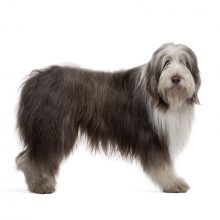Bearded Collie
Lifestyle Needs

The Bearded Collie is a medium sized, hardy dog. He supposedly descends from Scottish herding dogs and has a double, weather resistant coat. The Beardie’s long, shaggy coat requires a lot of grooming, care and attention – every day – to prevent tangles and the accumulation of dirt and debris. Ideally, he needs a house with a garden and access to the open countryside. He should have plenty of regular exercise and opportunities to run free.
Genetic Diversity
(Known as Coefficient of Inbreeding: 'COI'. It should be as low as possible.)
The UK Kennel Club breed average COI is 15% - See 'A Beginners Guide to COI'
Gene Pool Size
(Known as Effective Population Size: 'EPS')
23.9
EPS is a measure of how many individuals are contributing genetically to a breed population. It is a measure of the size of the gene pool in a breed. Lower than 100 is considered critical by conservationists and below 50 brings a breed close to extinction. For more information see the Kennel Club article.
Health and Welfare Problems due to Conformation
(Body shape and physical characteristics)
- With such a long and thick coat, the Beardie will be uncomfortable in warm weather and should be kept as cool as possible. Hair will grow to cover his eyes unless kept trimmed.
BVA/KC Health Schemes: www.bva.co.uk/chs
- Hip dysplasia: breed 5 year mean score 9.3 (parents should be lower)
- Elbow dysplasia: ideally O:O
- Eye disease – annual eye test
Estimated Breeding Values (EBVs) : EBVs for Hip Dysplasia are available for this breed
www.thekennelclub.org.uk/about-ebvs
DNA Tests Available
DogWellNet and IPFD Harmonisation of Genetic Testing for Dogs (HGTD)
www.dogwellnet.com/breeds
- Collie Eye Anomaly (CEA)/Choroidal Hypoplasia (CH)
- Dermatomyositis
- Progressive Retinal Atrophy PRA-prcd
- Multidrug Resistance 1
Availability of a DNA test does not mean that it is always necessary or even desirable for breeders to use this test.
Other Breed-Specific Health Screening Schemes
None known
Ask the breeder to show you the certificates for the above tests/screening for both parents. If any of the above tests have not been considered necessary by the breeder (and there may be good reasons), ask her to explain why.
Other Diseases Reported
(For which there are currently no genetic or screening tests for sire or dam)
- Immune mediated haemolytic anaemia
- Hypoadrenocorticism (Addison’s disease)
- Pemphigus foliaceus
- Symmetrical Lupoid Onychodystrophy (SLO)
Ask the breeder about the medical history of the parents, grandparents and great grandparents. Consider carefully whether to purchase a puppy if some of these or other diseases are in the family line.
Ask about the breeder’s policy in cases of serious genetic diseases occurring to your puppy in later life. Good breeders will request to be informed of such events in order to improve future breeding decisions.
You are strongly advised to buy from a breeder who uses (or is prepared to use) the AWF Puppy Contract and Puppy Information Pack (PIP): www.puppycontract.org.uk
The breeder should also be familiar with the CFSG/DBRG Code of Practice for Dog Breeding
Or the Kennel Club’s Assured Breeders Scheme Standard and Guidance:
Standard PDF | Guidance PDF